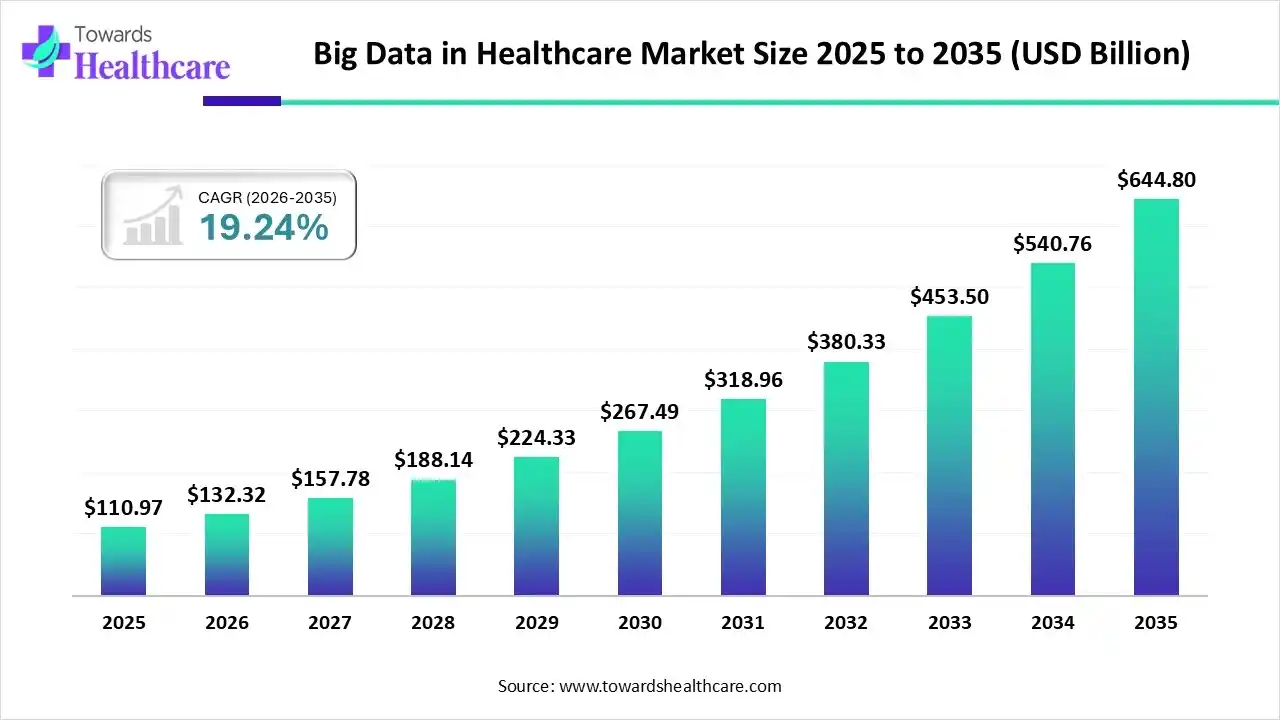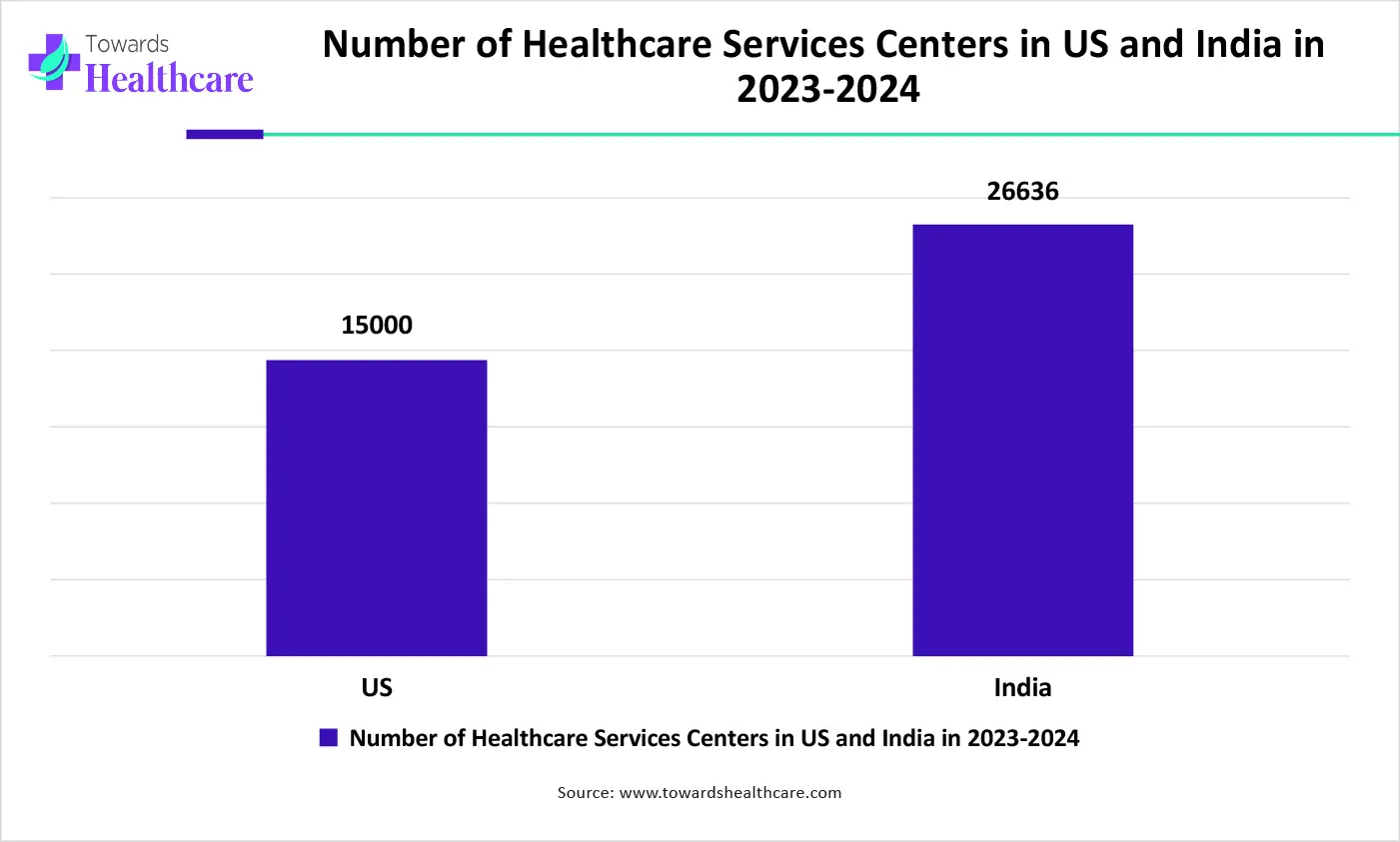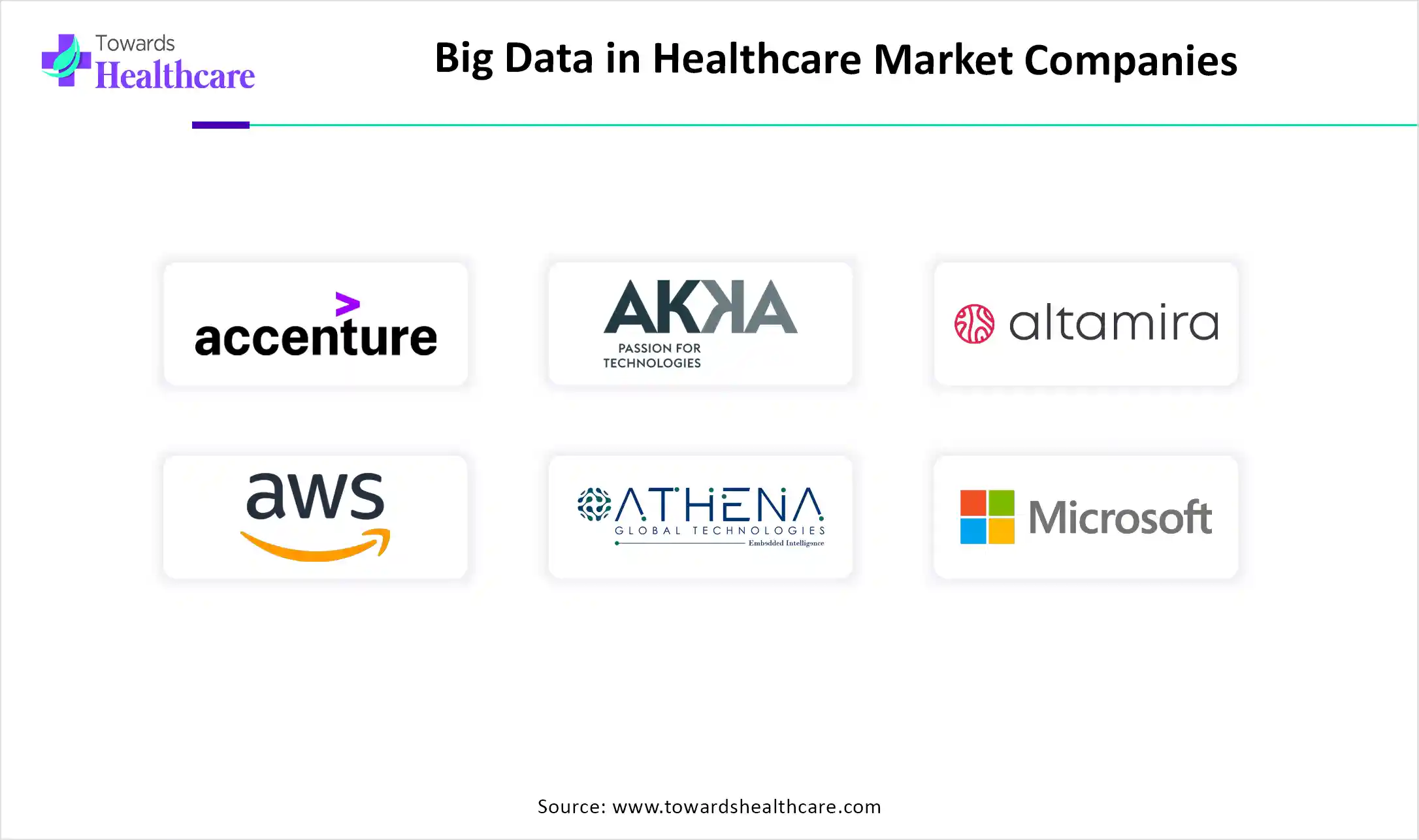January 2026

The global big data in healthcare market size is calculated at USD 110.97 billion in 2025, grew to USD 132.32 billion in 2026, and is projected to reach around USD 644.8 billion by 2035. The market is expanding at a CAGR of 19.24% between 2026 and 2035.

Numerous sources provide big data, which is then analyzed in the healthcare sector to improve patient outcomes, make better decisions, and reduce costs, among other objectives. The healthcare sector has grown to keep up with the enormous impact of big data. Big data in the healthcare sector is expected to develop globally due to the increasing demand for improved care management, early sickness prediction, and hospitalization processes. The necessity for real-time decision-making, the proliferation of electronic health data, and the rising need for customized treatment are all contributing factors to the growth of big data in healthcare market.
| Metric | Details |
| Market Size in 2026 | USD 132.32 Billion |
| Projected Market Size in 2035 | USD 644.8 Billion |
| CAGR (2026 - 2035) | 19.24% |
| Leading Region | North America |
| Market Segmentation | By Component, By Services, By Deployment Option, By Application Area, By Healthcare Vertical, By Economic Status, By End User, By Region |
| Top Key Players | Accenture, Akka Technologies, Altamira.ai, Amazon Web Services, Athena Global Technologies, Atom Consultancy Services (ACS), Microsoft, Nagarro, Nous Infosystems, NTT data, Oracle, Tata Elxsi, Teradata |
Primarily, “big data” is considered the study of huge and network datasets to achieve insights that enhance patient care, simplify approaches, and lessen expenses. The big data in healthcare market is experiencing major growth propelled by rising data volumes, the acquisition of AI-based solutions, and growing demand for personalized medicine. Basically, it involves, collection, storage, and analysis of a variety of information from different sources such as electronic health records, patient-generated data, and medical devices. Due to COVID-19, the adoption of big data in healthcare has increased, especially in sectors like telehealth and remote monitoring.
In the healthcare system, AI has a major role in big data as well, by its valuable contribution in the analysis of large volume datasets, such as electronic health records, medical imaging, and genomic information, in the detection of patterns and anomalies that may define early symptoms of disease. This permits for timely medication and increases patient outcomes. Also, AI algorithms enable analysis of individual patient data to generate customized intervention plans, which include factors like genetics, medical history, and lifestyle, which ultimately give rise to improved treatments and minimized adverse reactions. AI assists in the identification of efficient drug candidates and enhances drug development approaches by using huge datasets of genomic, clinical, and drug-related information.
For instance,
Developing a Vast Amount of Datasets
The big data in healthcare market is driven by several factors such as, mainly the rising huge volume of datasets from electronic health records (EHRs), wearable devices, medical imaging, and genomic sequencing, which require efficient storage, management, and analysis by using different tools. Also, the growing need for personalized medicine based on preventive analytics, which supports in identification of patients' risk in chronic diseases or any kind of adverse reactions they are facing, ultimately helps in the detection of proactive intervention.
Growing Concerns About Data Privacy, Security, and Expertise
Currently, the big data in healthcare market is experiencing the most important challenges, which are maintaining robust privacy and security of patient data generated during the process, like medical records and genetic information, which is one of the most subtle and main targets for cyberattacks. Along with this, widely needed skilled personnel to manage and analyze big data, which demands high expenses on the same.
Escalating Personalized Care and R&D in Drug Discovery
In prospects, in the big data in healthcare market, many opportunities are being generated, likewise, it allows for customizing medications to each case's characteristics, resulting in highly efficient and reduced risky interventions. Also, by using real-time data analysis from wearables and other devices, it is possible to monitor patients' data continuously, enabling timely alerts and interventions. Moreover, by using big data, one can able to detect efficient drug candidates and which boosts the drug development process.
By component, the hardware segment dominated in 2024, capturing a major revenue share in the big data in healthcare market. Mainly, it comprises the physical infrastructure, which includes servers, storage devices, networking equipment, and security solutions such as firewalls and VPNs, which are used to store, process, and examine the data. As well as the IoT is developing a huge volume of data in healthcare, in which hardware is needed to collect, process, and manage data from devices including wearables, biosensors, and else monitoring systems, is fueling the demand for this hardware segment.
By component, the software segment is expected to grow at the fastest CAGR in the upcoming years. In the big data in healthcare market, this segment is rising as it is useful in various organizations for analysis, and sharing of patient information, healthcare revenue cycle management, and enhancing workflows with staffing and supply chains.
By deployment option, the cloud-based solutions segment held the major revenue share of the market in 2024 and is expected to grow fastest during the forecast period. It has a significant role in the storage and security of vast amounts of datasets, like electronic health records (EHRs), medical images, and research data, which reduces the need for expensive on-premise infrastructure and enables easy access and sharing, influencing the expansion of the big data in healthcare market. Although cloud computing enables telemedicine platforms to provide virtual consultations and remote patient monitoring, it enhances access to care and patient improvement. Moreover, it has the beneficial characteristics of being cost-effective and providing robust security measures by confirming regulatory compliance with HIPAA regulations, which protects the sensitive data of patients.
By application area, the operational management segment dominated the big data in healthcare market in 2024. It has a vital focus on applying data analytics to raise the efficiency and output of healthcare processes. Primarily, this segment is widely employed to analyze workforce data to improve staffing levels, minimize absence, and enhance employee scheduling, resulting in greater resource allocation and reduced labour expenses. Also, in the identification of congestion and inadequacies in different processes, which gives targeted intervention and simplifies the workflow.
By application area, the population health management segment is expected to grow fastest over the projected period. This segment in the big data in healthcare market is driven by its reliance on the collection and analysis of data from different sources, like electronic health records, patient registries, and claims data, to generate a complete aggregated view of the population’s health. Also, PHM supports in management of care programs, disease registries, and community surpass efforts, to raise health outcomes.
By healthcare vertical, the healthcare services segment led in 2024, which held the largest revenue share of the market. Numerous types of health services are driving the significant growth of this segment in the market. It is fueled by factors like the demand for specialized personnel in healthcare organizations to manage the difficulties of big data execution and management. The healthcare services provide enhanced patient care and operational efficiency, from personalized treatment plans to boost workforce management and resource allocation.

The graph displays the number of healthcare services centers in the US and India, as this segment is majorly dominating globally in the big data in healthcare market. In the healthcare services center, there is a high demand for expertise in the healthcare system to manage complexities in big data execution and management, which provides effective patient care and increased operational efficiency.
By healthcare vertical, the medical devices segment is expected to grow at the fastest CAGR during the forecast period. Major devices like wearable devices, diagnostic equipment, and patient monitoring devices are widely connected and assist in data collection and transmission as well. Advantages of these devices in the big data in healthcare market are providing accelerated patient care and early detection of conditions, which results in increased patient outcomes, and also, by using big data, it enables the development of novel and innovative medical devices.
By economic status, the high-income countries segment held the major revenue share of the market in 2024. Dominancy contributing factors are mainly North America, which is one of the high-income countries that possesses market leadership, growing government encouragement, and investments in healthcare IT. These countries are prime of the acquisition of novel technologies, including AI, IoT, and ML in healthcare.
By economic status, the upper-middle income countries segment is expected to grow significantly in the upcoming years. These countries are experiencing significant growth due to the contribution of healthcare expenditure, urbanization, and a rising awareness of the advantages of big data in accelerating healthcare quality and efficiency. Besides this, escalating spending is allied with the adoption of novel digital technologies, which is propelling the demand for big data solutions.
By end user, the hospitals segment led the market in 2024, due to the dominant factors like significant volume generation of data from different sources such as electronic health records, medical imaging, and patient interactions, and these hospitals are widely using advanced technologies like ML and AI to operate this data and propel important insights. Major drivers are growing demand for medical procedures due to increasing cases of chronic conditions, trend towards moral-based care, and PHM.
By end user, the clinics segment is expected to grow at the fastest CAGR in the projected period. As clinics are operating, data from several sources like EHRs, patient feedback, wearables, and medical devices are impacting the expansion of this segment in the big data in healthcare market. By using this data and analytics, it supports in improvement of clinical decision-making, increases patient engagement, anticipates disease eruption, and personalizes care plans.
North America held the largest revenue share of the market in 2024. Nowadays, accelerating healthcare spending is fueling the demand for data-driven solutions, which enhance potential and lessen expenditure, and is a major contributor to the expansion of the big data in healthcare market in North America. Also, they are trending towards moral-based care, where suppliers are motivated to enhance patient results, further driving the demand for data analysis. Acquisition of advancements in AI, healthcare cloud computing, and else technologies is providing highly sophisticated data analytics and predictive modeling, which is one more impacting factor for the growth of the market.
For instance,
In the U.S, the driving factors are the acquisition of population health management by employing data analytics in healthcare organizations to detect and address health discrepancies, manage chronic disease, and improve complete population health. Additionally, they are widely adopting EHRs, which gives an abundance of patient data used for analysis and decision-making.
The market is propelled by growing demand for data-driven insights in healthcare companies to increase operational efficiency and make informed decisions. Moreover, the rising need to highlight instances of disease and viruses around the world, with the accessibility of cloud facilities, is also contributing to the growth of the respective market.
Asia Pacific is expected to grow significantly during the projected timeframe. This lucrative growth is impacted by the widespread acquisition of technological advancements like EHRs, telemedicine, and wearable health devices, to a huge flow of data, requiring analytics for potential operation and examination. Also, governments in the Asia Pacific are heavily investing in healthcare infrastructure and digitalization, which is further demanding for analytics to enhance healthcare delivery and patient outcomes.
For instance,
China has been adopting a wide range of technologies in healthcare, including the internet of medical things, which has led to a significant growth in the amount of data generated. Also, the healthcare providers in China are mostly focused on providing efficient quality care, in which big data analytics assists in the identification of sectors for enhancement and optimization of resource allocation, and improving patient outcomes.
For instance,
In India, significant factors are the need for optimized patient outcomes, reduction in expenses, and achievement of efficiency, along with the rising accessibility of data and development in data analytics technologies. Moreover, coupled factors, such as government initiatives and boosted awareness of data-driven solutions, are impacting the acquisition of big data in Indian healthcare.
The big data in healthcare market in Europe is influenced by the growing constant government boost and a well-developed healthcare sector, which are fueling R&D in the field. This R&D includes novel diagnostics, treatments, and preventive measures applying big data analytics. Moreover, they are putting digital transformation, with various providers looking for the adoption of data-driven solutions.
For instance,
In the rising France, the market is impelled by the adoption of technological advancements in healthcare, such as telemedicine and AI-powered diagnostics are enhancing patient experiences, minimizing expenses, and accelerating the efficiency of healthcare companies. Also, the French government invested in healthcare, and the increase in chronic diseases is propelling the demand for analytics solutions in big data.
For instance,
The market in the UK is experiencing significant growth, fueled by increased big data applications, including various factors like the growing acquisition of digital health solutions, government support for upgrading digitalization, and the increasing need to enhance healthcare outcomes while managing expenses. The application of big data in particular healthcare areas, including health surveillance, oncology, and precision medicine, is driving market growth.
The Middle East & Africa are expected to grow at a notable CAGR in the foreseeable future. The increasing adoption of advanced technologies and the burgeoning healthcare sector propel market growth. Government organizations support the development and deployment of digital tools in the healthcare sector. The increasing investments and collaborations among key players facilitate market growth.
The UAE’s National Strategy for Artificial Intelligence is setting the stage for a transformative era by leveraging digital tools in the healthcare sector, thereby aiming to become a world leader in AI by 2031. The Dubai Health Authority (DHA) has established the Dubai Health Innovation Center to drive innovations in healthcare technologies.
Latin America is considered to be a significantly growing area, due to the increasing healthcare expenditure, rising hospital admissions, and the growing awareness of telemedicine promotes the use of big data. The region is leading the charge in healthcare innovation and outpacing the rest of the world in funding and investments. Countries like Brazil, Argentina, and Chile are at the forefront of leveraging healthtech.
Brazil’s Ministry of Health had announced an investment of $200 million for the digitalization of the public basic healthcare system. The Digital Strategy for Brazil also boosts the integration of digital tools. The increasing private-public partnerships and collaborations among intergovernmental organizations foster market growth.

By Component
By Services
By Deployment Option
By Application Area
By Healthcare Vertical
By Economic Status
By End User
By Region
January 2026
January 2026
January 2026
January 2026